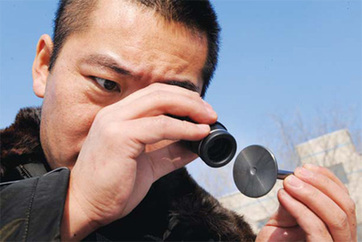Society
Changing tack
Updated: 2011-01-21 10:53
By Cao Li (China Daily European Weekly)
The private investigation business started taking off in China during the 1990s after the first firm opened its doors for business in Shanghai. Since then, the number of the detectives has risen to more than 200,000 despite repeated directives from the judiciary to ban the business.
 |
|
Zheng Yuxin started his company in 2004 to investigate infidelity cases |
In 1993, the Ministry of Public Security issued a directive banning private investigation. The ministry said private investigators were using powers, which were exclusive to the government law enforcement agencies.
But in 2002, the Supreme Court said in a ruling that evidence collected through secret filming and recording can be used in court. The real blow for the industry came in 2009 with the revised Criminal Law.
In a bid to continue their businesses, most of the private investigators now operate as business-consulting firms to take advantage of the gray areas where laws don't support, ban or regulate effectively.
With litigations increasing, most of the companies are pulling out all stops to provide vital information to their clients, often using illegal methods and devices.
Tao Xinliang, a famous lawyer and dean of Shanghai University Intellectual Property School, says his firm hires private detectives to collect evidence. "Violation of intellectual property rights is becoming rampant and obtaining evidences is getting more and more difficult," he says.
Indeed, it remains a tall task for many companies to unearth the counterfeiters who make a quick buck from selling duplicate goods.
The public relations manager of a major US-based pharmaceutical company, who declined to be named, told China Daily that his company employs investigators to unearth fake medicine makers.
Yu, the owner of a Beijing investigation company, says that he is getting more and more business now. Refusing to divulge his full name, Yu says most of his clientele comprises of women who suspect that their husbands are cheating on them.
"My clients are from early 20s to late 60s," he says. During his one-hour interview with China Daily, Yu received several phone calls from prospective clients. He also offers debt collection and fake good investigation services.
While admitting that business has been good, Yu also points out that there is more pressure now than ever to be disciplined as the police are keeping a close watch. "We don't use tracking devices as they are illegal. All that we do is track a person and his activities," he says.
Yu believes that if private investigators do their job properly, policemen will have more holidays.
Chen Wei, the founder of Jinlin Fuer Social Issues Investigation Co, says he is getting more cases to trace missing people. The number of missing cases has risen from 30 in 2008, to more than 40 in 2009 and 50 in 2010.
Chen, a former police detective who has been in the industry for 11 years, says his firm investigates cases that the police do not accept.
"The police accept cases based on the standards stipulated by law and the evidence."
Companies wanting to protect their brands often find that going to government is a cumbersome and lengthy process. "Many of them do not have the wherewithal and resources for that," says Chen.
Wei Yingjie, general manager of Shanghai SDE Business Information Consulting Co Ltd, says his company is getting more business investigation cases, which involve employees selling business intelligence and managers taking bribes. "Our businesses is growing by 30 percent every year," he says.
Zheng Yuxin, the founder of Xinjiang Gelei Business, expects his business to peak during the Chinese New Year. "We mainly investigate fake products that are in shops during the New Year shopping," he says. "After weeks of investigations, we cooperate with the local industry and commerce bureau in their crackdown on fakes."
Yu says: "The investigators are not as mysterious as people think. We are just normal people."
 |
"The public generally misunderstand the profession and equate us with the mafia," says Yu.
"A client once sought my services to scare off an overstaying friend. I did not take up the case," says Yu.
But not all investigators are like Yu. "There are as many bad investigators as the good ones," he says. Even the good investigators sometimes use illegal methods or devices to collect evidence.
Yu says that some investigators make money by taking deposits and not doing any work.
In September 2010 , Yue Cun, the general manager of a Chongqing investigation firm and the leader of a crime ring, was executed. According to Chongqing No 5 Intermediate People's Court, Yue and his gang had committed murder, intentional injury, blackmailing and illegal detention of people and illegal possession of guns.
Last year courts in Beijing tried more than 10 cases where private investigators used illegal methods to collect debts, obtain personal information and to track cheating spouses.
Some investigators admitted that they had to use their connections with the police or government to access information needed for the investigation. Some investigators are able to trace people by tracking their phone calls - a method that violates privacy.
One of the cases Beijing Chaoyang District People's Court tried involved investigators working with mobile phone service providers to obtain details of targets his clients wanted to investigate.
Zhang Peng admits that there is a demand for such information and investigation. The government should set up departments and formulate rules that makes such information available to those who can prove the need and outcome.
"It is hard to control the industry when it is in a gray area. The private investigation industry should not be supported by law unless there are strict and detailed rules on its conduct," he says.
He Jiahong, a law professor with Renmin University of China, believes that private investigators are more helpful than harmful. "They help people who have the right to investigate but are not capable of doing so. So their right to investigate is an extension of their clients' rights."
When an investigator works for a wife who wants to find about her husband's affairs, he is exercising the rights on behalf of her, he says. "Plus, it is not possible to ban them completely as there is growing demand for their services," says He.
Chen Wei believes that private detectives often cover investigations that are out of the judicial system's purview. They (private investigators) can complement the judicial system and help in ensuring safety.
"There should be laws defining the exact business range and conduct of private investigators and it should be different from the cases dealt by police," he says.
Cai Jie, a professor with Law School of Wuhan University feels that besides stipulating the behavior of the investigators, laws should also give them "a bit more power" than public to investigate. "In that sense, they won't bribe government or companies to access the information," he says.
Wang Yongjie, deputy dean of the law school at East China University of Political Science and Law in Shanghai, believes that private investigators should be allowed to investigate criminal cases and collect evidence. "In that case, the accused will have better chances to defend themselves," he says.
He Jiayong believes that private investigators don't need more power than normal public to work. "It only needs a clear definition of what they can do," he says.
Some investigators are also charting new courses in anticipation that it will soon be the future trend.
Zheng Yuxin says he started his company few years back to investigate infidelity cases. "But now my work is mainly to trace fake goods for big companies. I do not use any illegal methods or devices for this," he says.
Zheng says that he sends his investigators to work in the companies that produces fake goods and collates the information. His clients include multinational companies like Nestle and L'oreal.
Meng Guanggang, one of the earliest private investigators in China, says he focuses more on business information security. "For the past two years, I was employed by a company to provide security consultancy services like IPR protection or investment safety," he says.
The 56-year-old believes that is the future for private investigation in China. "With competition getting fierce, more and more companies will need such services. But not many are qualified to provide such services," he says.
E-paper

Ear We Go
China and the world set to embrace the merciful, peaceful year of rabbit
Preview of the coming issue
Carrefour finds the going tough in China
Maid to Order
Specials

Mysteries written in blood
Historical records and Caucasian features of locals suggest link with Roman Empire.

Winning Charm
Coastal Yantai banks on little things that matter to grow

New rules to hit property market
The State Council launched a new round of measures to rein in property prices.
